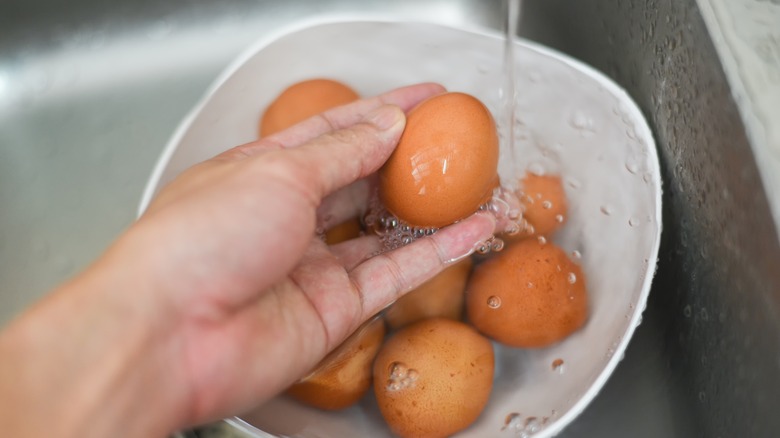The Temperature Of Your Eggs Makes A Huge Difference In Chocolate Chip Cookies
You've undoubtedly seen the instructions printed on your favorite chocolate chip cookie recipe: room-temperature eggs. It's a simple instruction and easy to overlook. After all, how much can the temperature of your eggs impact your chocolate chip cookies? Well, when it comes to baking, the small things do matter. And the temperature of your eggs can make all the difference in how your cookies turn out.
But why is it usually recommended that you use room-temperature eggs in your cookie dough? For one, using cold eggs may cause your dough to take on a lumpier texture, as the cold eggs can reharden your softened butter when it is mixed in, causing a lumpy dough that isn't fully incorporated.
Moreover, using room-temperature eggs, along with other room-temperature wet ingredients, allows your dough to mix more easily, letting all of your ingredients incorporate uniformly. This creates a consistent dough that traps air, creating a fluffier result. Additionally, your eggs break down more easily when warm, allowing for a smoother dough, and requiring less mixing. So next time you make a batch of cookies, you might want to consider setting out your eggs on the counter before you get to work.
Use room-temperature eggs
When making a batch of chocolate chip cookies, it's best to use room-temperature eggs. But what exactly is 'room temperature'? In general, room-temperature eggs fall between 68 and 70 degrees Fahrenheit. If your egg is uncracked, you can estimate your egg's temperature by holding it in your hand. If the egg's shell feels about the same temperature as your hand, then it is most likely at room temperature. If your eggs are cracked, you can check the temperature with a food thermometer, or simply test the temperature with your finger. If the eggs feel to be the same temperature as your finger, then they're good to go for your dough.
But how long does it take to bring your eggs to room temperature? Well, that depends on the temperature of your kitchen. It will take longer for your eggs to come to the ideal temperature in cold temperatures than it will if your kitchen is warm. So it may take anywhere from thirty minutes to two hours. However, you should be careful to not let your eggs sit out for longer than two hours, as doing so could cause your eggs to play host to dangerous bacteria growth. Make sure to keep an eye on the time when setting out your eggs for a bake.
Warming your eggs in a pinch
But what if you forgot to set out your eggs? Your butter is at room temperature, and your ingredients are all portioned and ready for use, but your eggs are still in the fridge — and you need to make your cookie dough as soon as possible. Well, don't fret. You aren't doomed to use cold eggs. There are a few quick ways to bring your eggs to room temperature.
All you need for this trick is a bowl, your eggs, and some warm — not hot — water. Simply pour warm water into a bowl and place your eggs (still in their shells), into the water. And voila! In five minutes your eggs should be at approximately room temperature. But if that still isn't fast enough, you can set the bowl under your tap and run warm water for the entirety of the warming process, which should speed the process along. So don't worry if you forget to take your eggs out of the fridge until the last minute. Room-temperature eggs are just a few minutes away.


